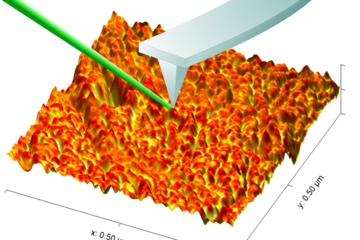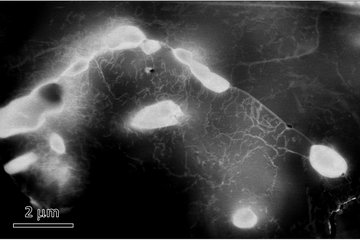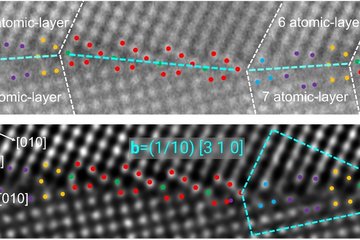All genres
1041.
Conference Paper
Recrystallization in Deformed and Heat Treated PET Polymer Sheets. Materials Science Forum, pp. 551 - 556 (2004)
1042.
Conference Paper
Kristallplastische Simulation in der Werkstoffprüfung. In: Proceedings of the 2004- Materials-Testing Conference of DGM in Neu-Ulm. DGM-Verlag (2004)
1043.
Conference Paper
An EBSD Study on Orientation Effects during Recrystallization of Coarse-Grained Niobium. Materials Science Forum, pp. 519 - 555 (2004)
1044.
Conference Paper
Characterizing the Grain boundary Effect in Bicrystal Deformation. Dislocations, Plasticity and Metal Forming, pp. 543 - 545 (2003)
1045.
Conference Paper
Simulation of Texture and Anisotropy during Metal Forming with Respect to Scaling Aspects. Strahltechnik Volume, pp. 99 - 106 (2003)
1046.
Conference Paper
Orientation gradient theory. In: PLASTICITY 2002, pp. 738 - 740 (Eds. Khan, A.S.; Lopez-Pamies, O.). Plasticity, Damage and Fracture at Macro, Micro and Nano Scales, Proc. PLASTICITY ’02, Aruba, January 03, 2002 - January 09, 2002. NEAT PRESS, Fulton, MD, USA (2002)
1047.
Conference Paper
Texture component crystal plasticity FE method. In: PLASTICITY 2002, pp. 260 - 262 (Eds. Khan, A. S.; Lopez-Pamies, O.). Plasticity, Damage and Fracture at Macro, Micro and Nano Scales, Proc. PLASTICITY ’02, Aruba, January 03, 2002 - January 09, 2002. NEAT PRESS, Fulton, MD, USA (2002)
1048.
Conference Paper
Experimental investigation of plastic grain interaction. In: PLASTICITY 2002, pp. 263 - 265 (Eds. Khan, A.S.; Lopez-Pamies, O.). Plasticity, Damage and Fracture at Macro, Micro and Nano Scales, Proc. PLASTICITY ’02, Aruba, January 03, 2002 - January 09, 2002. NEAT PRESS, Fulton, MD, USA (2002)
1049.
Conference Paper
Rolling and annealing textures of a ferritic stainless steel with 11 mass%Cr content. Textures of Materials, pp. 330 - 335 (1996)
1050.
Conference Paper
Textures in intermetallic compounds - Experiments and simulations. Textures of Materials, pp. 941 - 950 (1996)
1051.
Meeting Abstract
Atomic-Scale View into the Degradation of Ir-Ru Alloys during Anodic Oxygen Evolution. In ECS Meeting Abstracts, MA2020-01 (37), 1520. 237th ECS Meeting, Montréal, Canada, May 10, 2020 - May 14, 2020. (2020)
1052.
Talk
Strategizing for hydrogen embrittlement by protecting the weakest microstructural element. ECF24 - European Conference on Fracture 2024 in Croatia, Zagreb, Croatia (2024)
1053.
Talk
The Basic Science of Green Steel. Colloquium Lecture, Physics Department, Augsburg University, Augsburg, Germany (2024)
1054.
Talk
Exploring the Relationship Between Grain Boundary Structure and Chemical Composition at the Atomic Level. International Conference on Intergranular and Interphase Boundaries in Materials (IIB 2024), Beijing, China (2024)
1055.
Talk
Grain boundary-controlled lithiation of Li-solid solution systems for lithium metal batteries. International Operando Battery Days, Grenoble, France (2024)
1056.
Talk
Active learning strategies for the sustainability of structural metals. Royal Society Discussion Meeting on Sustainable Metals: Science and Systems, London, UK (2024)
1057.
Talk
Segregation-Driven Mechanics of White Gold at the Nanoscale: A Cursing or Blessing? Schöntal Symposium on Dislocation-based Plasticity 2024, Kloster Schöntal, Germany (2024)
1058.
Talk
Phase-field model for Hydrogen based direct reduction of iron oxides: Role of porosity. TMS - Algorithm Development in Materials Science and Engineering, Orlando, FL, USA (2024)
1059.
Talk
Transport and phase transformations phenomena in sustainable hydrogen-based steel production. 87th Spring Meeting of the German Physical Society, Berlin, Germany (2024)
1060.
Talk
Atomic-Scale Perspective at Alloy-Design for Additive Manufacturing. 2024 TMS Annual Meeting, Orlando, FL, USA (2024)











